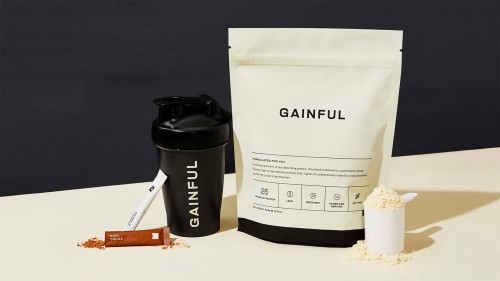Muscle Milk Protein Powder: A Dietitian’s Review
Published on April 20, 2022
Medically Reviewed by Natalie Olsen, MS, RDN
Muscle Milk Genuine Protein Powder is a high-quality, dairy-based protein supplement that supports muscle recovery and rebuilding. It’s third-party tested, so you can be confident that you’re getting what’s on the label, nothing more, nothing less.


|
Pros
|
Cons
|
What Is Muscle Milk Protein Powder?
Muscle Milk Genuine Protein Powder is a supplement that provides high-quality protein from milk to support muscle recovery and growth.
Each two-scoop serving provides:
- Calories: 280
- Fat: 9 grams
- Carbs: 21 grams
- Protein: 32 grams
Muscle Milk Genuine is also an excellent source of many vitamins and minerals, providing at least 20% of the daily value (DV) for calcium and magnesium and vitamins A, C, and D.
Muscle Milk Genuine provides a blend of the major milk proteins, whey and casein.
Whey is fast-digesting while casein is slow-digesting.
To make a shake, mix two scoops of Muscle Milk Genuine Protein Powder with at least 8 fluid ounces (240 mL) of water or milk using a shaker cup. Stirring with a spoon also works.
You can use more or less fluid, depending on your desired thickness.
You can also add Muscle Milk Genuine Protein Powder to pancake batter, smoothies, or other recipes to boost the protein content.
Enjoy Muscle Milk Genuine around your workouts to support muscle repair and growth or as a snack between meals to boost your daily protein intake.
Available flavors include Chocolate, Cookies ’n Crème, Strawberries ’n Crème, and Vanilla.
And you can choose from different container sizes that contain either 12, 16, or 32 servings.
Muscle Milk Genuine is third-party tested by NSF to ensure it contains the ingredients listed on the label and is free of substances banned by major sporting organizations.
CytoSport, an American manufacturer of sports nutritional products owned by PepsiCo, produces Muscle Milk Genuine Protein Powder.
Summary
Muscle Milk Genuine Protein Powder provides 32 grams of protein from the two main milk proteins, whey and casein, to support muscle repair and growth. It's an excellent source of calcium and magnesium, as well as vitamins A, C, and D, and it's third-party tested to ensure purity and quality.
Is It Effective?
Muscle Milk Genuine Protein Powder claims to help you build muscle and have sustained energy.
Build Muscle
Muscle hypertrophy or growth is the process by which amino acids, the building blocks of protein, become incorporated into muscle, thereby increasing muscle size. (1)
This process is driven by exercise, especially weight training, which strains the muscle and triggers a series of events that ultimately leads to muscle growth.
However, muscle growth can only occur when there are sufficient amino acids from protein available. (2)
This is why consuming enough protein each day is important to support muscle growth, even on days that you don't train.
While protein supplements like Muscle Milk aren’t needed per se, they make it easier to achieve daily protein targets since they are concentrated sources of protein.
They are also relatively inexpensive compared with whole-food forms of animal-based protein like meats and poultry.
A review of 49 studies involving more than 1,800 participants showed that protein powder supplementation combined with weight training significantly increased muscle strength and muscle size as well as improved body composition. (3)
The review suggested that total protein intakes of 0.74 grams per pound (1.62 grams per kg) of body weight support optimal muscle gains.
Of course, it’s best to get most of your protein from whole food sources, but protein supplements can still be a relatively inexpensive and convenient way to help you meet your protein targets.
However, other research suggests that up to 1 gram per pound (2.2 grams per kg) of body weight per day may be beneficial. (4)
In either case, Muscle Milk Genuine Protein Powder provides a combination of high-quality fast-digesting protein (whey) and slow-digesting protein (casein) to provide a more sustained release of amino acids.
Although the combination of whey and casein may be beneficial, it’s unlikely to offer greater muscle-building benefits compared with whey alone. (5, 6, 7)
Still, whey protein concentrate is the primary protein source in Muscle Milk Genuine.
Summary
Muscle Milk Genuine provides high-quality fast- and slow-digesting protein to support muscle recovery and building.
Sustained Energy
It’s unclear what Muscle Milk means by suggesting their Genuine product provides sustained energy.
However, it may be assumed that this claim is related to the product’s higher calorie, carbohydrate, and fat content.
Each two-scoop serving provides 280 calories, 9 grams of fat, and 21 grams of carbs.
Compare these numbers to traditional whey protein powders, which usually provide less than 150 calories and around 3 grams of fat and carbs.
Muscle Milk Genuine supplies more protein than traditional whey protein powders as well, but most of the extra calories provided come from fat and carbs.
The extra calories from these nutrients can help give you more energy to fuel for your workouts or tackle your day.
Summary
Muscle Milk Genuine Protein Powder provides extra calories for sustained energy.
Support for Claimed Benefits
Below is our summary of the evidence for the claimed benefits of Muscle Milk Genuine Protein Powder based on the available research:
| Build muscle | 4/5 |
| Sustained energy | 3/5 |
Side Effects and Safety
Protein powders have a strong safety profile, especially when they are third-party tested for purity and potency like Muscle Milk Genuine.
However, people who are lactose intolerant should avoid Muscle Milk Genuine.
If you are lactose intolerant, a better solution would be a whey protein isolate, which contains little lactose, usually one gram or less. Another option is a plant-based protein which contains no milk products at all.
Muscle Milk also contains fermentable oligosaccharides, making it potentially unsuitable for people with irritable bowel syndrome.
Like many other protein powders, Muscle Milk utilizes artificial sweeteners, such as sucralose and acesulfame potassium, to which some people may be sensitive.
Although artificial sweeteners have been suggested to play a role in the development of obesity, diabetes, and cancer, there isn’t strong enough evidence to reliably suggest or oppose these claims. (8)
Finally, Muscle Milk contains some maltodextrin, a type of carb derived from rice, corn, potato starch, or wheat, which may cause digestive problems in people with congenital sucrase-isomaltase disease (CSID) who lack the enzyme needed to digest the carb. (9)
Muscle Milk Genuine can be safely used by most age groups, ranging from teens to older adults.
Summary
Except for people with certain food allergies and intolerances, Muscle Milk Genuine Protein Powder is generally safe and well-tolerated.
Cost and Where to Buy
Muscle Milk Genuine Protein Powder is available online and in stores.
Although you cannot purchase the product through Muscle Milk’s website directly, they do provide links to online retailers that carry the product from which you can purchase.
If you prefer in-store shopping, you can input your zip code into the search function on their website for a list of retailers that carry it.
Because you cannot purchase Muscle Milk Genuine Protein Powder directly through the Muscle Milk website, the return policy and any money-back guarantees will vary depending on where you purchase it.
Muscle Milk Genuine Protein Powder costs around $18 for 12 servings, $22 for 16 servings, or $44 for 32 servings, but the cost will vary depending on the retailer and sometimes the flavor, with less popular flavors costing less.
You can contact the company on their website through email or by phone if you have questions about Muscle Milk Genuine Protein Powder or their other products.
Their website also houses several recipes that call for Muscle Milk Genuine Protein Powder, such as protein pancakes, protein cookies, smoothies, and more.
Summary
Using Muscle Milk’s product locator on their website, you can find online retailers from which to purchase Muscle Milk Genuine Protein Powder or locate stores near you that carry it.
How Muscle Milk Protein Compares
Muscle Milk Genuine is different from traditional whey protein powder supplements in that it contains a blend of the two main milk proteins, whey and casein.
Protein powder blends have become increasingly popular since they are a quick and easy way to support muscle recovery and growth, especially if you are not meeting protein needs with food.
Many people also prefer the taste of these blends, since casein offers a more creamy texture.
Here’s a look at how Muscle Milk Genuine compares with other popular milk protein blends:
| Product | Calories | Fat | Carb | Protein | Servings | Cost | Other Ingredients |
| Muscle Milk Genuine | 280 | 9 grams | 21 grams | 32 grams | 16 | About $22 ($1.36 per serving) | Excellent source of 6 vitamins and minerals. |
| Met-Rx Metamyosin | 210 | 2 grams | 3 grams | 43 grams | 16 | About $25 ($1.51 per serving) | Excellent source of 3 vitamins and minerals. |
| GNC Sustained Protein Blend | 130 | 1.5 grams | 4 grams | 25 grams | 28 | About $45 ($1.61 per serving) |
Excellent source of calcium. Provides some protein from egg whites. |
| MuscleTech Phase 8 Protein | 150 | 1.5 grams | 8 grams | 26 grams | 50 | About $47 ($0.93 per serving) | Excellent source of calcium. |
| Pro JYM Protein Blend | 140 | 2.5 grams | 4 grams | 24 grams | 51 | About $63 ($1.28 per serving) |
Excellent source of calcium. Provides some protein from egg whites. |
All prices were pulled from Amazon.com for consistency.
Summary
Comparatively, Muscle Milk Genuine offers a competitive price point based on its protein and calorie content as well as its offering of several vitamins and minerals. It’s also the only NSF-Certified for Sport product on this list.
Frequently Asked Questions
What does Muscle Milk Genuine Protein Powder do for the body?
Muscle Milk Genuine provides the calories and protein building blocks necessary to support muscle growth and sustained energy.
When should you drink Muscle Milk Genuine?
Muscle Milk Genuine is intended to be consumed around your workouts to support muscle recovery and growth. However, you can consume it other times, such as between meals, on-the-go, or before bed.
Is Muscle Milk Genuine good for weight gain?
Providing more calories than traditional whey protein powders, Muscle Milk Genuine can be a good option if combined with a diet that fulfills calorie goals to support weight gain.
You can add more calories by mixing Muscle Milk Genuine with whole-fat milk instead of water or blending in a smoothie with peanut butter, full-fat Greek yogurt, and oats.
What happens if you drink Muscle Milk Genuine without workout out?
Drinking Muscle Milk Genuine is fine to drink on your off days as it can help you meet your protein targets and supports muscle recovery. However, keep in mind that if your goal is to build muscle, strength training is necessary.
How long does Muscle Milk Genuine last?
Although all Muscle Milk products carry a "best taste date" to indicate when the product should be consumed to achieve the best flavor, it's not an indicator of safety. However, most protein powders should generally be used within two years of purchase.
The Bottom Line
Muscle Milk Genuine Protein Powder is a high-quality, third-party tested protein supplement.
It contains a mix of fast- and slow-digesting proteins to support muscle recovery and growth.
Compared with traditional whey protein powder, Muscle Milk Genuine provides more calories in the form of carbs and fat for sustained energy.
Muscle Milk Genuine is safe for most people and provides good value for the price compared with other milk protein powder blends.
At WellnessVerge, we only use reputable sources, including peer-reviewed medical journals and well-respected academic institutions.
- The mechanisms of muscle hypertrophy and their application to resistance training - PubMed:
https://pubmed.ncbi.nlm.nih.gov/20847704/ - Exercise, protein metabolism, and muscle growth - PubMed:
https://pubmed.ncbi.nlm.nih.gov/11255140/ - A systematic review, meta-analysis and meta-regression of the effect of protein supplementation on resistance training-induced gains in muscle mass and strength in healthy adults - PubMed:
https://pubmed.ncbi.nlm.nih.gov/28698222/ - Recent Perspectives Regarding the Role of Dietary Protein for the Promotion of Muscle Hypertrophy with Resistance Exercise Training - PMC:
https://www.ncbi.nlm.nih.gov/pmc/articles/PMC5852756/ - The Effects of Pre- and Post-Exercise Whey vs. Casein Protein Consumption on Body Composition and Performance Measures in Collegiate Female Athletes - PMC:
https://www.ncbi.nlm.nih.gov/pmc/articles/PMC3761774/ - Greater stimulation of myofibrillar protein synthesis with ingestion of whey protein isolate v. micellar casein at rest and after resistance exercise in elderly men - PubMed:
https://pubmed.ncbi.nlm.nih.gov/22289570/ - Consumption of Milk Protein or Whey Protein Results in a Similar Increase in Muscle Protein Synthesis in Middle Aged Men - PMC:
https://www.ncbi.nlm.nih.gov/pmc/articles/PMC4632440/ - Association between intake of non-sugar sweeteners and health outcomes: systematic review and meta-analyses of randomised and non-randomised controlled trials and observational studies | The BMJ:
https://www.bmj.com/content/364/bmj.k4718 - The patient journey to diagnosis and treatment of congenital sucrase-isomaltase deficiency - PMC:
https://www.ncbi.nlm.nih.gov/pmc/articles/PMC8298246/






